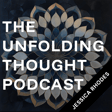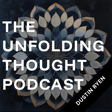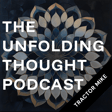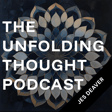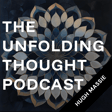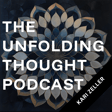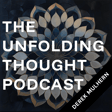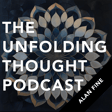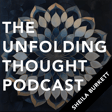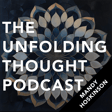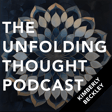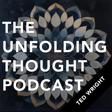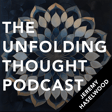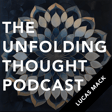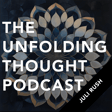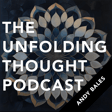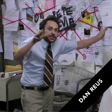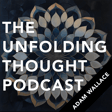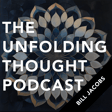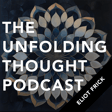Introduction and Guest Announcement
00:00:05
Speaker
Welcome to the Unfolding Thought podcast. My name is Eric Pratum. Today, I speak with Carlos Martinez, site director at Millipore Sigma, a leader in the life sciences industry.
Carlos's Journey and Philosophy
00:00:19
Speaker
Carlos shares his unique perspective on connecting science, leadership, and personal strengths to lead and build cohesive teams that find true meaning and personal growth in their work.
00:00:33
Speaker
In our conversation, we explore Carlos's journey from Puerto Rico to a global career, his thoughts on bridging differences to create innovation, and how tools like CliftonStrengths have shaped his approach to management and mentorship. And now I bring you Carlos Martinez.
Educational Background and Career Beginnings
00:00:56
Speaker
Carlos, thank you for joining me. Would you mind giving us a little bit of your background?
00:01:01
Speaker
Good morning, Eric. I like to think right that my my humble beginnings back in the island of Puerto Rico, that's where I was born, did did have an impact on on what I have become today. i I am one of six in my household. I'm the oldest, so I taught my parents how to be parents. I lived in the island of Puerto Rico through my 21st birthday.
00:01:30
Speaker
and then moved to Texas to finish my graduate school. So my bachelor's degree is in chemistry. I said bachelor's degree in science with a focus on chemistry. And then I came to Texas, specifically to Texas A and&M for a PhD.
Bridging Sciences and Career Realization
00:01:52
Speaker
So I finished a PhD doctorate degree in organic chemistry, so it's kind of weird, but you it's a very technical field. I had the opportunity at that time to work with two incredible ah scientists ultimately who supported me on my final
00:02:19
Speaker
PhD dissertation. One was in organic chemistry. The other person was in molecular biology and genetics, where where where I kind of combined these two life science and physical sciences together. And I hope that this is kind of bringing a little bit of a theme here already. I love bridging, and that is one of the things that I but i like about the way I'm wired.
00:02:44
Speaker
is I love bringing two different things together to hopefully produce something super, incredibly powerful. At the time that I was finishing my PhD was also the time of the now famous Human Genome Project. right So I was finishing my PhD and subsequently did my one year postdoctoral appointments with a gentleman named Richard Gibbs, who was one or was the head essentially of one of the institutions or labs that were awarded money by the United States government.
00:03:22
Speaker
to help sequencing the human genome. So I was right smack in the middle of that whole race to finish. So them, along with three or four others, right, were granted money by the government to actually do this. ah When Craig Venter came,
00:03:42
Speaker
as said as a private entity and then started to race down that path. It was was super fascinating just to see the discord and the competition going on in science, right, in this this whole thing.
Personal Life and Leadership Insights
00:03:59
Speaker
It was beautiful to see, it was a part of it, after which I joined the forces of what at the time was called Sigma Aldrich.
00:04:10
Speaker
based out of St. Louis in your neck of the woods. So that was back in the year 2000. And since I've been a part of of ah this company, which now is part or is essentially Merck, Merck of Damsted, Germany, it's a KGA. ah It's called Merck everywhere in the world with the exception of the United States and Canada were were legally We go by our business unit names, Millipore Stigma, and so on. So I guess what I would say is curious about this is about halfway my degree. I realized that I really didn't want to spend another minute in the lab. I wanted to find a job where I was given the opportunity to work to put together a team.
00:05:05
Speaker
and And that's how I ended up with Sigma Allbridge. I had opportunities to go work pharmaceuticals and other places. Ultimately, this is the place that said, hey, we need to put together a team and you're going to be it. It wasn't the most incredible offer at the time, but it was the offer that gave me the chance, the opportunity to do what I really wanted to do, which is a lesson for me in life and perhaps a lesson that people that may listen to this ah may also want to take away,
CliftonStrengths and Leadership Evolution
00:05:34
Speaker
right? Your opportunities s may never just be the ones that look the brightest, but they are nevertheless opportunities and sometimes you just have to give it a chance. So that's a little bit ah of that. and in In my more personal aspect of it, I am a father of two, a proud husband of one,
00:05:57
Speaker
for the last 29 years. And that is the other part that I spend ah most of my time on, right? It's either up working and helping some people along their leadership journeys or trying to lead within my family. And and that's that's, as you may know, even harder than it is to to do so at work.
00:06:20
Speaker
So that's a little bit of of of of myself. Maybe one more thing, and that is that I told you that about two years, three years into my my PhD, I i knew I didn't want to spend and another minute in the and the bench. And that was because I really enjoy helping people find what is unique about themselves. And along the way, about 10 years ago from today, which would have been in 2014, my wife introduced me to CliftonStrengths. At the time, it was StrengthsFinder. She said, you know, you should take this. you' You're going to love it. And and indeed, i I took it. I fell in love with the tool, so much so that a few years
00:07:11
Speaker
Not too long after that, I went to Gallup and got certified as a Gallup strength coach, which I have been for the last 10 years. And I have basically used that to help me become a better leader rather than actually going out and doing coaching on my own. It has been more about how can I use this to help others find their, aha,
00:07:39
Speaker
and And that's really that's what motivates me every day. Whenever I see the eyes of someone shine because I have noticed something and I mention it to them just at the right time and with enough color, and they go, you know what? I've never thought about it that way.
00:07:59
Speaker
You just walk away. You just know at some point that person is going to do something great, even if you never know it. i And that is enough for me for another day. It's like making a birdie on an 18-hole course, but then bowing and doing terrible on the OS 17. I still will go back to that golf course just because I made that one birdie. So that's that's ah that's the way I look at things, Eric. And a little bit about what motivates me maybe, uh, and that'll be about my past. Thank you, Carlos. I appreciate that. And there are so many things that you mentioned that I want to hit on. I doubt we're going to have enough time. That's okay. Actually, I suppose one thing that I'll say is I really appreciate you bringing up when you're talking about your background things at home because
00:08:55
Speaker
You know, we can separate personal and professional life and we can debate how much is managing or mentoring like parenting and how much is it not, but.
00:09:08
Speaker
At least as far as I view my professional life, I view my development as a person. I feel a lot of or see a lot of similarities between the maturation or whatever I might call it that I go through in work and then the maturation or the journey that I'm taking as a parent or as a spouse. So I appreciate you bringing that up.
Cultural Reflections and Adaptation
00:09:35
Speaker
I don't know if we should camp here for very long, but because you mentioned Puerto Rico and then moving to Texas, I'm curious. So you grew up in Puerto Rico. You started your studies there. You started down the educational journey, you know, the science path.
00:09:53
Speaker
In terms of culture, in terms of the way that maybe your fellow students approached one another or approached their studies, did you experience or do you remember any substantial differences between, but I guess, the way that people were or the way that school was run or anything like that in Puerto Rico versus Texas? Absolutely. And I do think I mean, culture is a big thing these days, right? You talk about culture at work, pretty much anywhere you go. And specifically, the culture in Puerto Rico was greatly influenced by Spain, right? So Puerto Rico being discovered or colonized by by Spain did bring all of that with it in addition to that.
00:10:44
Speaker
Very similar to the United States, our history also has spots of things such as slavery and and and other pieces which, though not the good thing to remember, it's is is part of history. And what that brought was was a mixture of peoples, right? At the end, if you go to Puerto Rico, and it's something I tell people,
00:11:13
Speaker
Puerto Ricans are considered a minority within the terms of the United States, right where there is a label for something or everything. But if you go to Puerto Rico, you're just a Puerto Rican. right and It doesn't matter whether you what what scale in the color spectrum you are.
00:11:34
Speaker
So that is fairly unique. So when I when i moved from my PhD to the United States, there were a few things that were very, to me, very different. Apart from the language, I had already started to study, we we studied both languages. Not everybody's very good at English, but we we are exposed. So apart from the fact that I needed to get my brains that are readjusted to to a new language on a day-to-day basis.
00:12:03
Speaker
There were other things ah which I want to to point out that actually translate also to the studying, which is there is a certain amount of warmth that the Latin culture has. It's very family-oriented. People, especially in Puerto Rico, it's a small island about 100 miles by 35. It doesn't really matter where you are. You are less than 70 miles away from the sea. There is that family orientation.
00:12:32
Speaker
And that translates to friendships that you don't have or can't go too far without bumping into someone that you already know. So when you go to school, it is a very similar thing. right You will find someone you know.
00:12:48
Speaker
And as they as you establish those relationships, they they carry on to the study. They're getting together. In those cases, however, I don't think that that's much different between the two, except that the biggest difference for me is is there is a certain amount of individualism in the United States that isn't in Puerto Rico, right? Like you live a bit more alone. It translates to families too.
00:13:15
Speaker
the more families I got to know. And I said, hey, when was the last time you talked to your brother? I said, i butt no, it was years. I go, years? Are you crazy? it I called my family every week. And and um and to this day, right ah I have been in the United States, in the continental United States, seems since
00:13:38
Speaker
right And I don't miss it. I don't miss calling. I need to. I need to establish and continue that connection. So going back to school, that was a it's just a different approach. It's just a little bit of a familiar or family approach too to almost everything you do. And in my field in chemistry, I did undergrad research. I was privileged enough to have a scholarship from the and NIH and then also from at what at the time was called Eastman Kodak. I know from the base of the poll, you know the picture stuff, they had this huge
00:14:14
Speaker
campus up north in New York and I had the opportunity to be funded through my bachelor's degree and then go and work there. I have plenty of experiences to share but ultimately the key there was that I went there with a bunch of other folks from there and we lived essentially very close to each other in Rochester and the the the same warmth we try to keep in there. Because you are again, you're in a place where you're not very you're not familiar with. All you have is the people that you know, and you you stick with them, and and you build upon that, in terms of confidence and and protection.
00:14:54
Speaker
So, to answer your question, I would come back and answer your question. Yes, there were differences, mainly, I think, along the lines of culture, which are just embedded more in a macro level, right? ah Not everybody. there are There are certainly people in Puerto Rico that love to be alone and don't want to be touched, right? But I say in general, you will see more family orientation, you see people remaining in touch. And that translates into studying in universities. Things that are out similar, kids like myself, as they got to high school, they weren't going to college, they wanted to be out of the house, right? And and we wanted to be in an apartment, even though that apartment was less than an hour away from the house.
00:15:38
Speaker
And that sort of created that level of independence that every one of us seeks as we grow up. So those are those are for sure similar, ah you know, the pressures of school and all of that. For me, however, as I moved into the United States to Texas A and&M, the the distance was difficult.
00:16:00
Speaker
Just the fact that I, in the weekends, I couldn't just hop in the car and drive home and have a ah warm meal for my mom was was difficult.
Innovation and Idea Combination
00:16:08
Speaker
But it it was difficult for about a year. And and then after that, this became my life. And I thrived and I and i love my independence. so but part But I love what is there's enough space for you to be alone if you want to and together if you want to.
00:16:24
Speaker
Nobody will tell you anything about it. Thank you. Some of what you described there actually leads to something I wanted to ask you about from your background. So I'm not going to get your wording correct, but You said something like, you like to take two different things or two different ideas and put them together and and see if you can make something bigger, better, you know something new. And as you were saying that, you reminded me of ah the story, or maybe I can describe it as an argument.
00:17:01
Speaker
that was made for why it was that of all the people that were searching for the structure of DNA, why was it ah Watson and Crick that are credited with that? And the, I forget what book this was in, but the person who I was reading made this argument that you had a lot of scientists that were molecular biologists or they were zoologists or whatever it was that was their specialty and
00:17:35
Speaker
Mostly, they were you know some leading scientists who maybe had some post-doc students with them or some PhD candidates or whatever it was you know working in their lab, but it was kind of just one person within one specialty that was ah leading these experiments to try and find the structure of DNA.
00:17:56
Speaker
And then in the sort of binary, I guess, that is set up in this story, you had Watson and Crick. And I think one of them was a molecular biologist and the other one was a zoologist or something like that. And so similar, but still so slightly different fields. And they were both apparently looking for the structure of DNA. But what they would often do is apparently they would go on walks together and they would talk about the experiments that they were doing and the way that they saw things and when you talk to someone who has a different perspective and you can be open and you can be challenged and you know like I can keep going but you have the opportunity
00:18:41
Speaker
to have the person that you're talking to say, I think I also heard you say this effectively. Oh, I never thought of that. Or now that you say this, you know, so Carlos, you did an experiment or you experienced a thing in work and you describe it in this way.
00:18:58
Speaker
And I perhaps say back to you, I don't see it like that. I see it like this. you know the It's like an iron sharp sharpens iron sort of scenario. And again, the argument that was made and in this book that I was reading was that you know you can, like you were saying more or less, take two different things and use them to make something better, bigger, new, or whatever it is. And so now after after that very long preamble, what I wanted to come back around to is
00:19:29
Speaker
Is it too, am I reaching when I think that with the way that you described a perhaps tighter knit community or more, you know, being closer to your family at a bare minimum physically, if not also, you know, ah emotionally, let's say, and having a warmth in the culture or relations with people in Puerto Rico that you experienced Either you didn't experience quite as much in Texas or it's just different. Do you think that um that might have contributed to your your upbringing, you know that ah Puerto Rican
Cultural Influence on Leadership Style
00:20:05
Speaker
culture? Do you think that that might have contributed to your desire to take two things and put them together? you know Chocolate and peanut butter might be better together and or to want to build a team and not be that solo scientist and I'm using air quotes here.
00:20:21
Speaker
That is a very interesting question and sort of brings a little bit of that norch nurture nature question as well. you know How much influence do these things actually have in who we are? So I personally believe that there are some things that are just innate and it really does not matter where you're born or who you're surrounded by, these things are.
00:20:49
Speaker
about a lot of the having to do with genetics is simply what came with the package, right? But that the experiences that you have through culture, through where you live, through where your parents brought you to, whether you travel or you didn't, whether people, you had a big family or a small family, basically bring out a lot of what is already in.
00:21:19
Speaker
through the means of practice, right? It's just simply you experience it and then there is a reaction to that experience that tells you either I want to do more of this or I this is i don't want nothing to do with this anymore, right? A little bit influenced by that pre-wiring. But of course, if you're not experiencing those, you may miss on the opportunity to do that. And then later on in life,
00:21:43
Speaker
You may experience that years and years later, not in the same group, not with the same people. And you go, whoa, it was all that all this time. you know like But it was always there, it just never had the opportunity to sprout. However, that influence right that you had, I do remember, and oftentimes you have to do these exercises when you go back and say, where was that first time that you saw that you had this intense desire, right, to to identifying other people what may them what makes them great. And it's hard, right, because our memories get a little blurry over time. But I but i but i can but i can tell you that for my first, ah through essentially through ninth grade,
00:22:40
Speaker
where I was pretty much in in the nucleus of my family every day, very protective. First kid, I told you right, I taught my parents how to be parents. And they were just hugely protective. This may sound crazy, but when i when when it got when I got to ninth and going to high school, I had an aunt, which I adore, who who said, no, no, no. Carlos needs to go to the high school that is, I was not zoned okay This is the high school in the damn town of my little town, as opposed to a new high school that was just next door, where I would have just basically had the same people be surrounded by the same people. So if you have someone who actually created such a hiccup in my lifeline, right that was that aunt. And she found a way, she brought me in there. That's the time that I came out of my cocoon. All of a sudden I started to see
00:23:40
Speaker
I started to see the possibilities, who I was. I had done so in church. I could probably sense some things and there's some fire that was out there that just wasn't lit up yet. It was just a little spark. And then I met these folks i that were at the time, they were in the downtown area. They they were they had lots of relationships. i am And it fascinated me how quickly and how easy they formed relationships.
00:24:11
Speaker
through my relationship with them by meeting them. right I started to meet some of the same people. I started to go, wow, this is incredible. right i was I was not by definition the most popular person as in you know the the quarterback or the captain of the team or whatever, but I was intelligent. So I i was i was participating of things that were visible And i'm I'll come to where all these things come together. But all of a sudden, I was in the eye of the people around me. And to this day, my mom calls me every once in a while and says, I just ran into so-and-so. he was but She was with you in high school. And they say, hello. I said, who is this person? right um But when you are on stage, a lot of people will know you.
00:25:02
Speaker
And we'll remember you, especially if some way, somehow you did something, said something. And this is sort of that influencing or that then thing that I love to to think I'm i'm doing in the world is that you will say something or you will do something that will affect someone in some way. And that connection.
00:25:22
Speaker
between what you say or what you did and what that person experienced and then did as a result of. It's a bridge. It's an invisible one, but it will be there. And at some point, they will remember you. And then you go, OK, I'm glad that I said that. But you know at that moment, you you were not that. Going back to to how this whole thing of bridging happens is I remember distinctively at that moment in my life, 10th grade,
00:25:50
Speaker
was the time where I i thought, okay, I really enjoy this. really I just absolutely love that. and And it continued to evolve until I got to to college and in college.
00:26:06
Speaker
it It really just took off, right? And and I started to get involved and in in undergrad research and I met even more people and now I'm new professors. And and then you start seeing the value of those relationships. Strategically speaking, and you know, we're talking about that earlier before before we started recording that there there is this way of being strategic.
00:26:30
Speaker
And in my case, it's far more about the relationship building, and is that's the way I'm strategic than it is about spending a lot of time away thinking about how I'm going to do that, right? It just happens. It's just about observation. It's about just simply seeing something in someone and being able to articulate what that was at that very precise moment, sparking a specific conversation that then eventually just grows into something amazing. If not,
00:27:00
Speaker
just simply drives that person to go and do something amazing, right? and And you may never see it. You may never know it. But when it does happen, and if you ever find about it, it's the moment, right? It's the teacher moment when the student comes back and say, hey, Mr. Martinez, do you remember me? That is, I don't look for that moment when they come back. I just look for the moment.
00:27:26
Speaker
when I can say something that that I believe will have at least the effect of sparking something. Curiosity about the self, curious about what they did, or just simply highlighting what they did so they can repeat it. That's what I live for, right? That's what I live for.
00:27:52
Speaker
One of the things you were just saying a minute ago reminded me, one description of culture is that it's a process of social learning. So social meaning essentially a group of people, right? And so if the group is learning something, you can imagine it a scenario in which a person identifies, hey, in this type of situation, the best tool to use is a hammer or words or I don't know what really ah without getting too specific into a made-up scenario you know an individual identifies they do an experiment basically and we're all doing experiments when 50,000 years ago or scope way into the past we lightning strikes or we have bad weather or whatever we do an experiment am I safer
00:28:42
Speaker
I do I stay do I stay drier if I am under a tree versus in the cave or whatever you know. An individual finds a solution and then that gets passed on until such time as.
00:28:57
Speaker
This is just what we do. And people forget why they do the thing
Fostering Innovation and Focused Thinking
00:29:03
Speaker
that way. you know Where did it come from? What's the ultimate reason? And they may not even really know what they get out of that custom that has been passed down. It's just what we do. You mentioned earlier.
00:29:17
Speaker
As well, I think when you're giving your background that you like to tell someone, well, here's what I think about that, or here's how I sit see the situation, or have you ever thought about it in this way and then sort of just walk away? And you reminded me of when you said that.
00:29:34
Speaker
There's a quote from Blaise Pascal that goes something like, a man will always be more convinced by ideas that have come into his own mind than by those which have come into the mind of others. And I know if that's not the exact quote, but the idea is if I do that experiment and I say, hey, when it's raining,
00:29:58
Speaker
I'm going to stay dry if I, you know, build this sort of lean to structure. I came up with the idea, but when it starts to rain and Carlos, you say, Hey, Eric, you need to go build a lean to in particular, because I'm high in self-confidence as we talked about before we started recording. Um, and we'll probably come around to that. I'm probably going to go.
00:30:21
Speaker
Yeah, whatever. You know, Carlos is smart and all, but I have a lot of good ideas. But if I come up with the idea myself, I'm going to be quite convinced. And so um what I'm trying to ah stitch together here is I really like that you have an appreciation for we have sort of cultural standards or we have a way that we do things. And yet,
00:30:48
Speaker
Despite the fact that this is just the way we do things, things just get passed down to us. You also have an appreciation for the fact that sometimes you need to ask a question or give your opinion, but your opinion in brief. Hey, Eric, this is the way that I see things and then just walk away and let me process so that I can come to a point of wisdom, if I can call it that, rather than you just imparting me your wisdom, which only becomes my knowledge.
00:31:17
Speaker
I've been reading this book, so i I may have mentioned in a previous conversation with you, called Brain Chains. The author is feel-comprinal, and I think he's a neuropsychologist. The book aims to to help us understand that distractions are not good, right? That such things are multitasking, doesn't exist. that that our brains are designed in a certain way where there is a need to there's a news for things that are repetitive, that your brain already gets sort of our primitive thing, right? We drive, we don't think about pushing the gas and the brake when all those things with practice come ah together, but that there's a part of the brain that needs singularity of thinking.
00:32:11
Speaker
And it's the one that takes to the most energy, sort of our conscience, right? And and he states, and naturally I think science to this point that states ah that we can only think about one conscious thing at a time. Which means, going back to listening, when you are with someone else, creations, things that come from a discussion can only happen if you are willing at that very moment to do the one thing. It's just listen. So you're consciously listening rather than arguing with the other person that your point is better than theirs. Is at that time that that innovation happens, right? Is when you are willing to not only give
00:33:05
Speaker
out what you think, your idea, your opinion, but also willing to listen to the other person's idea or opinion, hopefully creating a new one, right? One that takes elements from that idea and elements from the other idea and create again, do you hear the theme of bridging? it's It's just, it just doesn't go away. It's to me is, is the the possibilities, right? The possibilities are,
00:33:33
Speaker
are incredible if you just allow for those two things to come together and then sprout a brand new idea, which is even better. At that time, yeah you individually, you can go away and experiment on your own on what that idea may become. But at the time you dedicated that one time, that extremely high energy moment,
00:33:58
Speaker
to listen, if you're listening, but also to then allow for that creation. And then that other part of the brain, which is the librarian archiving connecting part of the brain, then takes time when you are not thinking and when you're maybe sleeping to connect all the dots, make the weird connections So the the next time you are in your conscious part, you bring that out, right? And now it makes a lot of sense. It's fascinating, book by the way. It's it's incredible. It's a drain chain. So that's where it refers to. It's the things that basically take you away.
00:34:34
Speaker
The brain chains are things that take you away from those moments where you allow your conscious self to truly make those discoveries. ah You basically chain them back there, most of which has to do with, I think he called it ICT, which I believe are is something along the lines of individual connectivity tools or something like that. That's what he calls them. Which are your phone and you know answering emails or that desire to do things right away as opposed to focusing. We're going back to to the point you're making. Yes, absolutely. And in culture, it's the same thing, right? is It's an opportunity for someone to see something that it eventually becomes the norm. But it was somebody's
00:35:23
Speaker
idea at some point. And yes, I think we all in some way learn best when we experience it ourselves than when someone else does. My personal position on that is that the smartest people learn as much from that as they do from somebody else's mistakes. You don't want to repeat people's mistakes, right? If you are, then it makes me think, perhaps you're not observing close enough. It's not the same as trying and it's just, if you are going to try, try something truly different, not do just the same thing and form the same same mistake.
00:36:05
Speaker
Yeah, I totally agree with you and hopefully that last point actually lets us come around to, you've come to the point where you are a manager, a leader, you mentioned CliftonStreaks and all that, but I want to say something real quick about, one, I will have links, so brain chains and other things, I'll have that in the show notes in case anyone is interested, but also for anyone that's listening, Carlos, you were saying about you know, within this book, the argument is you can really only focus on one thing at a time. And an exercise that I'll have people go through in presentations sometimes, I'll ask people to stare at one spot, something that's fairly simple, like look at a spot on the carpet in front of you or a spot on the wall, whatever you're looking at, make it fairly basic and keep your focus in that one spot. But then take your mind
00:37:00
Speaker
and take in the things that are around that spot. So let's imagine that you're staring at the wall and you know the curtains for your window are just off to the left. You can see them, but you keep your eyes on one spot.
00:37:11
Speaker
The further out you go from the center of your focus, the less and less detail you get about the thing that you are aware of. It's there. But unless you turn your eyes to that spot, you can only take in so much about that object.
00:37:30
Speaker
And I use this example often because I think it makes a lot more obvious what the landscape of your consciousness is like when you're watching TV and your phone buzzes and your child's ah to also talking to you from 15 feet behind you and all this stuff is going on. And to some extent you take it all in or you flip back and forth so quickly.
00:37:57
Speaker
that you don't experience that you're just kind of mentally looking at one thing, then the other thing, then the other thing, then the you know, back and forth. You can to some extent consciously take it all in, but the further you get from the center of your mental focus, the less information you get. Yeah, it's very good. And one of the points that made in the book
00:38:27
Speaker
talking about specifically texting or being on the phone while driving. is that physically your eye is the part that focuses on something. It's very tiny. It's sort of a matter of millimeters. And that you have that peripheral view, which is not that focus. It's blurry. Just exactly what you're describing, right? So in order for you to remain with your eyes on the road,
00:39:00
Speaker
you truly have to keep your eyes on the road. So every time that you look at your GPS or someone is calling and you want to know who's calling, or you drop your eyes to touch something, second, two seconds, three seconds, you know that is there. You think, you know, you can see what is coming from the side, but really what your brain is telling you, there is something coming from the side, but you can't tell what that something is unless you you move your eye and focus on that. This is exactly what you're talking about, right? And so we do a de-service. And I think we are all in some sort of ah stage in our journey on on whether or not we have come to the realization that being present
00:39:45
Speaker
is almost akin to being focused. So if you're talking to your child, be present, right? Be listening only to that. Forget about the buzzing of your phone or something else. Can you really do that? It's the hardest thing to do, right? I mean, we have so many inputs all the time. Sensory, physical, whatnot. I mean, it's just ridiculous. But the point you're making is is essentially that, right? is if If you do not allow or consciously allow for your brain to block the fuzz that is around you, you will miss. And that's what he calls intellectual productivity. right So you kind of your intellectual productivity comes down drastically because now you have this moment where you took away your focus.
00:40:39
Speaker
from whatever context you were into a new context, that's where exactly the words, to then try to come back to the previous one, which is most likely, it'll take you minutes, if not 10 to 15 minutes, just to get back to the same level where you were, just trying to reconnect the things. um So if you actually think of it that way, it makes a lot more sense to say, you know what, for this time, and you know I'm putting my phone away on silence, whatever, and I'm just going to focus. You do that and then you become more sequential on your doing rather than parallel, which he argues is not very productive, regardless of how good of a multitasker you think you are.
Role at Millipore Sigma and Company Mission
00:41:23
Speaker
It's just the science doesn't support it. It's just not not true. and Anyways, fascinating thing. We can go down that hole for for a while and maybe never come out, but we'll see. Bottom line is if you want to build the right kind of bridges, if you want to tell someone the right kind of things so they actually steer towards greatness or excellence, you need to be paying attention. And if you and the only way to pay attention is is if you are you are noticing and that's where where I think we are all a little different. What will attract you about someone or something that someone said or something that someone did will be different than mine and that's perfectly fine. We will call out different greatness about other people. But the key is in noticing it is about hopefully building the bridge by telling that person at that very time with as much detail as possible how they made you feel
00:42:22
Speaker
That's data. like Nobody can tell you that you were not feeling that way. You can tell them at that precise moment how they made you feel and what exactly it was that they were doing. and They can choose at that point. I'm going to repeat that. you know That felt good to me too. I'm going to do it again. and The next time you do it better and better and better and better and that leads to excellence, which is talking as a maximizer. That's really what I love to see. People really firing at full power right with all the gifts that they have, that they were given through genetics, or if you have, I believe, about a higher entity that it was given that way. It doesn't really matter. At the end of the day, you are asked to do the best that you can do with the things and the tools that you are getting.
00:43:16
Speaker
For everyone listening, Kyle has mentioned Maximizer, so we're going to come around to CliftonStrengths here in a second. But there was a point in your education, in your career, where you decided, I guess, if I can put it this way, that you weren't so interested in being an individual contributor.
00:43:36
Speaker
I suspect that that affected your career choices. um You also probably had some just innate characteristics, behavioral traits, whatever that over time, you know, one step after another led you towards being a manager, so to speak. So real quick, can you describe what your company does, what you do day to day, um whether you know and you could talk about your particular facility or the company ah more specifically. And then when we come around to you being a manager, I would love to explore CliptonStrengths and ah ah how that plays into your interactions with people that you manage.
00:44:21
Speaker
So earlier I mentioned that I have worked for the same part of the company for a very long time, since 2000. At the time I was hiring to a facility, a manufacturing and facility that manufactures a DNA, synthetic nucleic acids. So.
00:44:51
Speaker
Hopefully, a lot of people that listen to this know at least that we all have DNA in ourselves, and in order to study the sequence or how it all interacts and moves and does what it needs to do, there are some tools that are necessary. A long time ago, somebody got a Nobel Prize for the for discovering or at least advancing what is called today the polymerase chain reaction, PCR, and that and there has become essentially a tool, the biggest tool for the identification of areas in what we call the genome, that is the sum of our DNA.
00:45:32
Speaker
And that basically sprung this industry where I got my first job, which was a chemical way, synthetic way, to create little portions of that so-called genome using that tool called PCR, for example, to amplify a region of the genome that you wanted to study more. So there's just one way.
00:46:01
Speaker
ah These days, of course, has become a lot more complex. and There's such things as real-time PCR. There's such a thing called RT-RT-PCR, which stands for reverse transcriptase, real-time PCR. And all of these tools allow us today to do things such as diagnosis.
00:46:20
Speaker
So there are certain illnesses and diseases that are but have a root in genetics and those can be studied. So what we do is we create or manufacture those pieces of synthetic DNA to enable our customers to actually do those or help in those discovery. Many of the things that today people are familiar with, for example, during COVID, people would get tested and they have a very quick test. You remember an antigen test that you can do over the counter, boom run it through a yeah lamin are a ah membrane and you will see whether or not you had it or not. Or in some instances, you had to send your sample
00:47:02
Speaker
away for hours or days for someone to run a PCR with these tools like the ones we make to basically tell you, yes, you have it, right? One is more sensitive than the other. So we enable our customers to basically make those discoveries. We like to say that we spark discoveries right that hopefully elevate humanity. That's kind of our vision as a company. So the company I worked for mentioned locally, we were born in 1988, 8488 out of Baylor College of Medicine. And at the time it was called Genesis Biotechnologies.
00:47:44
Speaker
And that became Sigma Genesis when Sigma Aldrich bought us in 1998.
00:47:51
Speaker
and And eventually evolving to an end us today, we're just part of Millipore Sigma, which is part of Merck, KGAA of Daimstadt, Germany. This massive company is It's based out of Germany and it has three major business, electronics, so basically anything that you see for your phone or even microchips and the likes.
00:48:22
Speaker
We provide, again, materials for that industry. We have health care. We have a health care part of it. And we also have the life sciences, which is where I am a part of. So my company my site, the site that I had the privilege of leading is is here in Texas, just north of Houston, in a little town ship called the Woodlands.
00:48:48
Speaker
And we, again, provide that kind of tools where it's the rest of the company, Life Science, provides the rest of the tools, enzymes and reagents and weird chemicals. And for those of you who have been in science for a very long time, ah the old Sigma Aldrich catalog, the Sigma Red, big, big thing, and the Aldrich catalogs are part of my history as well.
00:49:13
Speaker
Ultimately, the way we're making a difference is simply by making those little creatures who make hundreds of thousands of unique ones. That's also another piece that is super attractive, but what I do is that everything that we make, we make to order. So customer orders on one day and within 24 hours we have to produce you know a large amount of them, say 60-70% of our products, basically are made to order within 24-48 hours. That is just cranking out very quickly. What is unique about an app, it links back to what I was saying before, I love
00:49:55
Speaker
what is unique about people. And I think this this business, which I have called home for a very long time, by its very nature, is unique. We make unique things for unique people, for unique scientists out there.
Leadership Journey with CliftonStrengths
00:50:09
Speaker
um And though that's not personality, it's just simply yet another version of that desire to be surrounded by the unique. And that's that's that's something that So I think that that sums up sort of where we where we came from, how we ended up, where we are today, the kinds of tools that we make, how many of those we do, how unique that is, and how we're hopefully making a dent in the world with the products we make, which again, goes eventually, hopefully back to my particular leadership, how I lead this group, how I have evolved over the years as a result.
00:50:49
Speaker
thanks to the availability of tools like CliftonStrengths. So you said that your wife introduced you to CliftonStrengths in 2014 and you did the assessment, you had some level of experience with it over time, eventually you became certified. so ah Walk me through a little bit of that and then how it plays into your management and maybe beyond that. It could be parenting, it could be how you interact with your people that are leading other facilities in your business. But where where did that start? Cliff constraints, you know, what was your experience? How did it evolve and then how does it play in today?
00:51:33
Speaker
That is exactly how I started. so My wife, who works for a large company of her own, ah we're just finished with taking the assessment as
00:51:49
Speaker
Oftentimes, which is the case as the new thing, right? Hey, somebody told them this is a great thing to do. And here's the tool. She came back with the book at the time was still a book with the little thing inside. And I bought my version and I got it. And ah interestingly, a couple of two interesting. Number one is When we compared our ah results, we were very similar in terms of themes, yet we were so keenly aware of our differences and how we see the world and how we approach the world, which is something I love about Clifton Strands, which is it's far more about how we are different and how we are the same.
00:52:32
Speaker
and and And not saying goes there. right It's is's calling those differences a gift to be leveraged. right Going back to the question we the you know the discussion we had before, when you go out and walk with someone else and you are open to what they have to say or how they see the world, new things come. right And that's why I love about it. That's why I think it's a great compliment to A lot of the other tools exist that, in my opinion, are far more about. There's a lot about how we are the same and how we can work together from the sameness perspective, where CliftonStrengths, I think, is how do we work together from a differences perspective, right? which Which attracts me most.
00:53:14
Speaker
So it wasn't very long after I took the assessment that I went to my then manager and I said, listen, I think this is a great thing to do. I would love for the company to sponsor me. And taking this, state the the certification process is about a five day, at least at the time, it was five days up in Nebraska when Gallup is is is headquartered.
00:53:36
Speaker
with a lot of other folks wanting to do exactly the same, like Gallup had at that point, maybe a few years before that, decided that they wanted to go big and and and train as many coaches as possible so that they would go out and tell others about CliftonStrengths and continue to change the world, that was their aspiration and still is, to change the world by helping people see what they most likely do create and let that change the world in itself.
00:54:07
Speaker
I'm happy to say that I'm part of that process. So I tried to convince my manager that, hey, this this is something the company should invest on, not because it would allow me to go out and be coach, but actually because it would allow me to coach within. I had not made fully the connection between the my path in leadership and coaching. And I think ultimately I called that my leader coaching journey, right? So that was sort of where I was coming from on that one. Later on, Gallup published a book called, It is the Manager. And it's essentially a little textbook that allow basically the message is we are called as managers or leaders.
00:54:50
Speaker
to serve in a different way than it was before, instead of a boss or now a coach. right That's what people are looking for. So I don't know if I would say that I was ahead of my time, but I was just thinking,
00:55:02
Speaker
How can I use this to be better at what I do? And it worked out. I still praise this manager for seeing that. And and he has continued to work for the company and he's he's done incredible things. He's a great leader, taking on yet far more challenges than I have in his own way. And I can see his aspirations, right? But he gave me the chance and, you know, say 10 plus years later, here we are.
00:55:30
Speaker
talking about it and hopefully ah using it as a way of managing better, of being a better leader to coach people rather than to direct people. And as I think in many ways, sort of what how that has evolved for me at work and how I have incorporated that knowledge, that experience, that certification into how I lead every day.
00:55:57
Speaker
Is there a philosophy I guess behind CliftonStrengths that is we can better understand ourselves or we can better lead if we at a minimum understand a person's strengths and then maybe on top of that if we work to accentuate those strengths or if we try and position people to use those strengths as opposed to another philosophy, and I don't know what that one would be, but something that is perhaps more concerned with someone's weaknesses. So yes. In fact, a lot of what Clifton's strengths is based on is this principle, right to the kind of brought up by Donald Clifton, Dr. Donna Clifton.
00:56:51
Speaker
of what would happen if people would focus on what is right with people rather than what is wrong with people. That's essentially what but was at the base of all of his research and work. Clifton Strenz, then Strenz Finder, riley really came together as a result of a lot of interviews. And this is what I find unique. It was a lot of interviews of people of all ways of life, CEOs to to people in janitorial services, to doctors, to teachers, focus on those that were most successful. So a lot of the questions was, how do you succeed? And and and ultimately, that's where it led to to the tool. The tool, kind of deceiving, called Strance Finder, did not tell you
00:57:46
Speaker
precisely what your strengths were, but rather they gave people language that they could use to truly discover what their strengths were. But as a result of the the assessment, people would get information about how they most naturally got things done or build relationships or influence others or think about the future.
00:58:15
Speaker
And then people the the expectation was that people would take that information and then invest with intention on developing those findings. And so that's where, again, Gallup's definitions of talent and strength come in. So talent is a pattern of thinking, feeling, or behaving that can be productively applied. And that's a big part of it, productively applied, right? You can all have feelings, but they'll take you in the wrong direction. Well, now maybe not, right? Then a strength is the product of
00:58:57
Speaker
taking talent and adding skill and experiences to produce what they define us as a strength, which is the ability we all have to perform a given task to near perfection every time we do it. Later on I, through reading and and familiarizing myself with a gentleman named Marcus Buckingham,
00:59:25
Speaker
I also added to that to that particular definition of a strength in saying, and it also must energize you because we sometimes are good at something.
00:59:38
Speaker
but in a particular context, it may not excite us as much, even though we're good at it. My my best example, the easiest one, is for someone in human resources. There may be this person who loves and gets a kick out of diving into thousands of resumes, looking for the top five resumes. But don't ask them to then tell you which of those five are the best. They just love the intensity, the the curiosity that comes from reviewing this many. But then if you put them in a position where all they do every day is just look at those five, they may not be as energized, even though they may be good at it. But there may be someone in human resources with similar themes, which actually finds it far more exciting to work on those five and just get the one.
01:00:35
Speaker
right, and would find it absolutely mind numbing to go through thousands of resumes. There are, how many strengths? 34. Or 34, okay. And if I'm hearing you correctly, if I do, strengths finder, now CliftonStrengths, right, which I have, and I'm sure we'll we'll get to that. This is not an assessment that's going to tell me what type of career I should have, as well as yeah should you choose to go into a trade?
01:01:03
Speaker
should you choose to go into some type of office work? You are more likely to be, to perform at top level, to be energized by these types of tasks or work within that chosen field. I think so. And again, it's very complicated, right? It's far more complicated, perhaps we could discuss here today. So number one, yes, this is not a career definition or picking tool.
01:01:31
Speaker
is by far not it. It is is really about the persona. It's about you. And it's about the principle that the more you know about yourself, the easier it will be for you to land in a place where you can put all of that and more to work on a consistent basis. right Ultimately, what you want is a place where you on an everyday basis can probably tell to yourself, you know, every time I come to work, I have an opportunity to use or to do what I do best.
Strengths, Weaknesses, and Empathy in Leadership
01:02:06
Speaker
ah that's That's what you want to be. At least the opportunity. It doesn't mean that you're going to get to do 100% of everything that you like to do. That would be nearly impossible. But if you can almost always basically say,
01:02:24
Speaker
Every time I come here, I get a chance to do what I do best. I have the opportunity to do so. ah Not only is your manager making doing a good job right by creating such an environment, but you potentially are in a role where you get to fire up most all the time, right? Did you get to reframe your world and talk about your world and think about your task through the same lens every time or very often?
01:02:57
Speaker
And so going back to that question originally is that CliftonStrengths focuses on what you do best as a means to produce excellent results consistently. Whereas they don't say you should not know your weaknesses. In fact, they will go as far as saying you should know them as well as you know your strengths.
01:03:24
Speaker
because you don't want them to bug you down, right? You don't want them to get in the way. So there are going to be some roles where you may not have natural talents. For example, I will share, I mentioned in my top 10, so these 34, we call it themes of talents, but interchangeably people call them strengths and it's okay. I think so long as we're talking about the same thing.
01:03:54
Speaker
But the steams of talents, 34 of them. are ordered once you take the assessment from one to 34, from most attempts to less attempts. The ones at the bottom, the bottom flag, for example, are ah things you need to know what is out there, but it's not your focus. What you need to know, for example, my number 34, and again, going back to two very peculiar things about me and being in a position to to lead others, is number one is in my top 10, I don't have any
01:04:26
Speaker
such themes considered to be strategic thinking, right? So if someone has seen that and say, okay, this is my this is my card to whether you will be a leader or not, I probably would have been scratched out, right? But most of the thinking, you can't be a leader. Wrong, right?
01:04:49
Speaker
We can all lead, we just lead in different ways. And the other end, and this is something that has been very big in this day and age, is my number 34 is a theme called empathy. And what is it that we're told a thousand times a day about great leaders or great managers?
01:05:12
Speaker
that they need to practice empathy, that we need to be empathetic. How in the world would a person that has empathy number 34 succeed at being empathetic in some way? Well, there is this thing as being empathetic and learning skills to listen carefully, to be present. We talked about that earlier. And there is this thing called leading with empathy. Two different things, right? Two different things. If I have empathy number one, right? I am the kind of leader that has the sixth sense for emotion. You can tell. You can walk somewhere. You can feel it. There is something weird about you but that allows you to do that. I don't have that, right? What that means is
01:06:06
Speaker
is I can be empathetic at times, but my my natural move is towards, as soon as I hear you telling me that you have something bothering you or something that is dragging you down, I will listen for five minutes and I will be almost immediately trying to solve your problem, getting you out of that and moving forward. Someone that leads with empathy,
01:06:34
Speaker
They can sit back and listen to you for hours upon hours, days, if not weeks, right? They are just naturally patients with that. They may not agree with you. Empathy is not about agreeing with you. It's just simply being able to get see the world through your eyes. and And I can see it for about a window of five minutes before I want you to to be moving towards resolving whatever that is, moving towards excellence. And those are two different things. I can still show empathy, but I will not be
01:07:09
Speaker
as excellence as someone who leads with empathy, from the Clifton Strands perspective. right Just again, it's not a a ah dictionary definition of these words. don If you actually taken in the assessment and you were to look at the definitions, you will see that it's not an Oxford dictionary definition.
01:07:29
Speaker
right is is far more than just that. So going just to close this, yes, c Cliffs and Strengths and the philosophy behind it is, let's focus on what comes more naturally to us and help us be successful to essentially make your weaknesses irrelevant, even if they exist, right? You will be far more successful and certainly faster if you focus on what you were strong at rather than what you're weak at. Let's just say that.
01:08:04
Speaker
somebody's listening to this, they apply for a job and jobs have personality assessments, skills assessments, whatever. Let's just make up a scenario in which you have taken this assessment and you've done CliftonStrengths and someone looks at your results without having talked to you or had some experience with you. It sounds to me like they can understand you at a certain level because they read your top five bottom five whatever it is but there.
01:08:40
Speaker
is another aspect to you that is not shown here. you know so And i I appreciate the example that you give of, it's not that you are not empathetic. It's that in certain cases where you might describe it as being, it's not natural, it doesn't give you energy, that's not the place that you start from or whatever else, but it's not that you're incapable of doing that. and i My guess would be that there are plenty of people who walk into CliftonStrengths, you know, they experience it for the first time and perhaps misunderstands that. They think that this is a pure encapsulation of what you're good at and what you're bad at.
01:09:23
Speaker
I would say that it is true and why Gallup has chosen to train as many coaches as possible. They they will always almost always say, everybody needs a coach, right? And when I do run into someone,
01:09:41
Speaker
and offer either A, to share with them a key for them to take the assessment. I never just simply share the key. I like to have a follow-up conversation. And again, I don't i don't i don't coach for, at this point, I don't coach for for profit. I use it within within work, and that's where most of my connections within Clips and Strains are, I absolutely want to follow up because most, again, we are trained that way. I i think the way we are trained is to try to fix what is broken. And most performance reviews and performance development is essentially the same, right? is what Is what is the gap? What is broken? Let's go fix it. And that's what you spend most of your time as opposed to
01:10:35
Speaker
Okay, so then it is it getting in the way, right? If it is getting in the way, let's say, for example, you are in a marketing job and you hate communicating, i will have ah we would have to have a conversation, right? Because ultimately, what is marketing if it isn't about communicating the value of a product or making connections with a group of people that eventually will buy your product? And in that way, though,
01:11:01
Speaker
right You may find from taking the assessment that the things that come more natural to you may be best used if you were in a role. Maybe you're still with the marketing. there are different I'm sure i mean you are in the marketing world. that There are different layers of marketing. right Some people are in this part and some people are in that part. Some people do the research, whereas some people actually translate the research into something, into insight.
01:11:31
Speaker
And this person may love marketing just because of the research and not necessarily because of how it is presented out into the world, whereas the other one does. Now, that one that is more fascinated with telling the world something may lead with communication, talents, right? Or or maybe a bit more out there may love the stage, may love to connect value with other pieces.
01:11:56
Speaker
ah Whereas the other is far more about everything that makes up that desire, right? The research behind it. And there needs to be a bridge. I go back to my bridge. There is the bridge between the people that go out and seek the details and the research and hopefully start to see the connections and that person that then takes that information and further translates it into something that is digestible by the audience that trying to reach.
01:12:29
Speaker
So what I see fascinating about all these is that once you deep dive into these things, my wife actually gives me a hard time with this and my kids as well, is that i'm I almost seem like always talking to you and and and listening to analyze you. And I really don't do it. My goal is not to analyze you. I'm not a therapist. My goal is to find and hopefully articulate in an intelligent way, what is it that I heard?
01:12:58
Speaker
that you can then use and repeat. What's my ultimate goal is I would love to to eventually help you see how X behavior or thing you did is something that will repeat and that you should indeed, repeat and invest on so that you can be even more successful. Is this where it plays most obviously into your role as a manager? Oh, yes, absolutely. I think that that is the prime place for for using this. um I joke. and so I'm not sure that I would ever be able to go solo as a coach because I think personally,
01:13:50
Speaker
I don't like the the process of marketing, like actually thinking about it what I need to do to market myself. I will love somewhere where all I need to do is do and people know and then they just simply call me. I'll still be wonderful. But within my context, I have plenty of clients. I don't have to go and seek them. They they are the are the people that I deal with every day and I get a chance to I have a captive audience, right? It's an audience that wants to succeed, to perform, that are linked to the same goals. And and my job is to help them see how they uniquely contribute to that. And Cliffs and Strands is just a tool. It's about uniqueness, right? It's about those differences that make us great, that we should
01:14:42
Speaker
We should um leverage the heck out of them with positive intent. then gallup and This applies to pretty much every every tool, I think, in many ways. But they sort of preach these five principles.
01:14:57
Speaker
One principle is these themes or these results is one word are ah neutral. They're not positive, they're not negative. You can make them positive or negative. right We know plenty of leaders that are leaders because they have followers, but whose values and principles are questionable.
01:15:17
Speaker
right of whether or not they're positive or not. right We have plenty in history. ah They're not labels. That's number two. right You should not go around and say, ah, that's your self-assurance. For example, that's you you know getting in the way of, and you just basically start stamping labels. Your extrovert, your introvert, whatever, is far more than that. right we are We are complicated creatures, very complex to be reduced to a single word label, right? Whether that is a theme,
01:15:51
Speaker
or a ah personality trait or the color of your skin or your culture, whatever, is a disservice. Number three is use positive intent, right? This knowledge about someone, going back to what you were saying, if you have, if I had to share with you my results and you share with me your results,
01:16:14
Speaker
That information should be used with pattern intent. It should just be used to enrich our conversations, to ask better questions, to poke for and be curious about what that means, and then ultimately to produce something better, right? Again, going back to that addition, one plus one here is not equal to, it's more. The fourth is, and differences are a gift.
01:16:42
Speaker
They're not things to divide. They're not things to push apart. They are things to be leveraged. And then goes back to this in the final one, which caps very well is, is we all need each other, right? Talent develops in the context of others. And that's where observation comes in. If you see something, say something and say it as soon as you see it with as much color as you can, so that person can digest that and then use it and use it and get better and better and better to the point that whatever their weaknesses were become completely irrelevant, right? Kind of like Messi with his left footishness, right? Nobody would have hired him because he only can do it one side, not like Ronaldo. And yet, well, history tells a different thing, right? He made it such a a weapon.
01:17:42
Speaker
that his right leg became irrelevant. I mean, it didn't matter. And I think that that's sort of the the journey we are on, right? It's make your strengths so, so obvious, as such an obvious part of your success, that your weaknesses become irrelevant. Before we come around to wrap this up, I want to keep going a little bit on, for your experience as a manager,
01:18:07
Speaker
where this plays in, how it helps ah by asking, if I recall correctly, there's a person on your team or who works with you that has either gotten certified or has gone fairly deep on the Grow model, which is something that I have a lot of experience in. And for anyone that's not familiar with that, Grow falls within the performance coaching camp, but it's really just a tool to facilitate focus in person. And GRO stands for goal reality options and way forward or willingness. So it has its place largely focused around helping someone focus on what is your goal and then what are you going to do to get it done. We don't have to explore GRO but
01:18:53
Speaker
I'm curious, you have this person who has gone fairly deep on Grow. Maybe you have other people that have been interested in other things, or you've seen space, or a Berkman assessment, or Myers-Briggs, or whatever else. And so where have you, in your experience as a manager, as a leader, seen a need for other skill sets or other tools? Or if you haven't,
01:19:22
Speaker
How often and when does something like CliftonStrengths play into your leadership or your mentorship of people you work with? At Merck, if there's something that they have, is it's just plenty of tools. They've taken the approach of providing a sea of tools. Amongst the tools,
01:19:45
Speaker
is something called insights discoveries. I'm not sure if you're familiar. It's kind of similar to the pre precise traces based on that. Those are the same principles, right? CliftonStrengths, interestingly, is not one of the tools. It's one that I have covertly been trying to push because I do think that it complements those. So I can speak for for what we have done and just recently we we embarked on a what we do, Supervisor Academy. we We realized that we were bringing people into supervisory roles, so people leaders. so
01:20:22
Speaker
without really formally equipping them for being so and how to do this best and kind of align expectations for the role with what they naturally brought to the role versus how to connect all of those for ultimate excellence and performance. And so part of it was we said, our insights discoveries is the tool that the company as a whole has um promoted for many years. So we're not going to step away from that because I do think that they provide ah information about yourself that is very valuable, more along the lines of personality traits.
01:21:06
Speaker
Cliques and strengths, though, it falls under that psychometric type of assessment. I don't know that I would call it a personal, I did great assessment. I think I call it a, ah let's find out how do you most naturally succeed assessment? And it focuses on something different, which to me is another layer of granularity on your journey to understand you or yourself. How else can you lead? And going back to how do you lead?
01:21:34
Speaker
Now, how else can you lead effectively if you don't know yourself first? I mean, it's ludicrous to actually think that you could, because then you will be potentially trying to emulate a lead like others, as opposed to focusing on leading the way you most naturally do. And I think the last sort of word these things connect when it comes to to leadership and my own personal journey on leadership. So, personally, as a leader,
01:22:05
Speaker
ah the way I lead. I mentioned earlier something that i when I was going through my personal coaching, so I was you know working with someone as an executive coach, someone that was coaching me. And and what we said as our goal was how to become a better leader coach. That's what I really called it at the time. And it was with this in mind.
01:22:28
Speaker
night that There is there is a there's common ground and I realized that my role as the site director for this manufacturing location is to set direction, but he's also but I also have this manager role, which is a title I have and I have a certain authority.
01:22:50
Speaker
ah Whereas to lead, you don't need a title, right? I mean, you've heard that before, right? You look you don't need a title in order it to lead. You need followers. And followership is a psychological decision by the person who decides to follow you. And they do so if they align with your values, with what you're preaching, with the way you do it so. But you don't need a title for that. These days, again, going back to to me,
01:23:16
Speaker
What I believe these tools do is just simply making you more aware of what comes more natural to you. So that being aware of that, you know where your triggers are. You know when you're going to go in a not very productive direction.
01:23:35
Speaker
and where you would, right what things interest you more and what don't, which then leads to effective collaborations. right and Then you find someone that that does that naturally well and you pair up.
01:23:51
Speaker
right And then you produce something even better. So for some things you can go solo, although most of us, it's kind of hard to just be solo. And in other cases, you pair up with someone and that otherwise would just enjoy doing what you don't and what doesn't bring you energy at all. And that's sort of my principle. I tell people, I walk around with a little chart that has every single person in ah at the site. I can do that because we have less than a hundred people.
01:24:22
Speaker
I wouldn't recommend this for someone who has 5,000 people in there and their campus and you're deleted there. You walk with a little book and you're basically going through every individual. But I have the chance to to actually have them a single page, every single name with their top five at the very least. If they have more, I can see that as well. And I don't use it just as a way to simply manage my conversations. although It will influence me, but more to as a leader is to find when there is an opportunity. And I think that someone has certain things that could make this a very interesting, exciting opportunity.
01:25:10
Speaker
knowing their contacts and their journey to basically say, listen, I i know you love, for example, I know you love to to to do research and look into and find tools, for example.
01:25:25
Speaker
as someone with input may like, right? And I have this project we're about to go into. We just just need people to look into to spend time doing that. Would you be interested? And all of a sudden you click on something. This person may be a technician, just moving product. And then all of a sudden they have this additional ah deviation from it but that inspires that curiosity.
01:25:53
Speaker
And now they're growing, right? Now they're growing, they're expanding. They're not just moving product from left to right or right to left. They're also kind of exercising the other part, which just comes natural to them. And that I think is is is one of the ways where I i feel I bring my my unique way of leading, right? is Is connecting with the individuals at that level first. And then through that, setting them up and and i learn in learning journey, right? That they cannot resist.
01:26:23
Speaker
because it just speaks to them. And that makes my role as a leader that much easier. That means right that then I have people that are constantly looking for those themselves they because they know themselves.
01:26:37
Speaker
And I focus on yet other ways of having an impact, which ah this year has been an amazing one for me because this whole thing I told you, this covert way of bringing in Clifton's strengths has picked up. People want to know.
01:26:54
Speaker
how they can lead best. And I have had five, six of these workshops with leaders within the company from around the world, essentially bringing them together by knowing what the Cliffs and Strands are, how they can work together as a team, and how they can then spring out and launch it on their daily basis.
Coaching Philosophy and Conclusion
01:27:14
Speaker
So I think that's ultimately what I feel and how I feel Cliffs and Strands has changed me is being unapologetically mean in a very productive way, spend lots of time adding more knowledge and skill to those things that come more natural to me so that the things that are at the bottom are like empathy. Which by the way, if you ask anybody that has met me or worked with me, they would probably disagree that I am not an empathetic person. We all have the capability of being empathetic, right? We can't.
01:27:54
Speaker
It's just that we use different channels to do so. In my case, I think I use my my individualization and my relator, which I think is that basically speak about the personal relationship and that desire to know something special about you as a means of knowing your story. And once I know that story, I link. And once I bridge with you at that level, then performance is easy. Then I can talk about performance all the time.
01:28:22
Speaker
and And they are open, people are open to listen to what I may suggest, or the questions I may ask, or even my advice if that comes to it comes to that point, like in a mentorship relationship, which which I have a few of those as well, which again, I know there's sorts of joy for me, which is now that people think I have something they can benefit from,
01:28:47
Speaker
They're asking for it. It sort of feels my significance world. That's my number seven attention, where ah you are in a position to make a difference and you know it because people are asking you for it, but not allowing that to get over your head and just remain humble. Know that people are asking you because you have something that they they think is is valuable, but that doesn't make you someone above themselves, right?
01:29:16
Speaker
Gotta stay there. Otherwise, then then it defeats the purpose. I don't know if all of that we actually came together, but I think ultimately that's what I thought you may have asked. You made a statement about facilitating a person getting into a place where they can really play, if I recall correctly. And then also, I think you were saying they're good and bad things, if I can call it that, if you want to read it as good and bad, but you can also read it as neutral. This is a ah description of an aspect of the person. And it can be good, it can be bad, but
01:29:52
Speaker
There's a good portion of good or bad that really kind of depends on how you choose to read it. And you may read something as bad that could be an asset in your life, in your experience. Oh, yes. Now, I wish that we had more time, but I know that we have to Wrap up. I think that there's probably another discussion that we could have about the importance of getting people into Positions where they can at least as I i put it play
01:30:24
Speaker
Everyone, I have to jump in here, unfortunately, because while you could likely tell that Carlos and I were getting close to wrapping up, we unfortunately got disconnected right at the end of our recording. Thankfully, Carlos agreed that I could go ahead and wrap this up and share where you can find him. The best place to find and connect with Carlos is on LinkedIn. I've placed a link to his LinkedIn profile in the show notes.
01:31:00
Speaker
please do go and check him out and send him a message or connection request, follow him and so on. And while I've already said this to him directly, I want everyone that's listening to this to hear and also have it be out there with the recording. Thank you, Carlos, for recording with me. As I hope you know, I've enjoyed every conversation that we've had.
01:31:27
Speaker
We clearly have some shared interests. And so I appreciate you being here. I also hope that we will speak again, not just on the podcast, but also personally. So once again, thank you, Carlos. And thank you everyone for listening to this.

